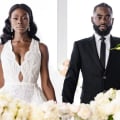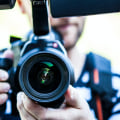Planning a wedding is no small task, and having photos taken of the special day is an important part of the process. Before you book your wedding photographer, it's essential to make sure that the venue they will be shooting in has all the necessary rules and regulations in place. Researching the venue's rules and regulations for wedding photography can help ensure that your photos come out perfect. From lighting restrictions to noise levels, from timeframes to copyright issues, there are many factors to consider when researching venue rules and regulations for wedding photography. Taking the time to fully understand the rules and regulations before you book a photographer can save you time and hassle on your big day. In this article, we'll look at how to research venue rules and regulations for wedding photography, so you can be sure your photos are perfect. Before the big day, it’s important to research the venue rules and regulations for wedding photography.
This ensures that your photos turn out the way you want them to, without any surprises on the day of.
Researching venue rules and regulations
for wedding photography is essential for a successful event and successful photos. If you fail to do the research before the wedding, you may encounter unexpected obstacles that could ruin the photos or even the event itself. When researching the venue rules and regulations, there are some key questions you need to ask, and certain aspects you should pay attention to.Firstly, ask the venue about their policies for external vendors. Will you be able to bring in your own photographer? If so, what kind of restrictions will be in place? Are there any restrictions on the use of flash photography, or any other special equipment? It’s important to get this information in advance, so that you can plan ahead and make sure your photographer has all the necessary equipment. It’s also important to ask about specific rules or regulations that may apply to the space. Does the venue have any noise restrictions? Are there any time constraints on how long photography can take place in the space? Do you need to get permission from anyone before taking photos? Knowing these rules in advance will help you plan accordingly and ensure you have a smooth process on the day of the wedding. Different types of venues may have different rules and regulations.
For example, churches often have very strict rules about photography during ceremonies. Some churches may not allow any photography at all during the ceremony, while others may only allow certain types of photography (e.g. no flash photography). It’s important to check with the church beforehand to make sure you know what is allowed and what isn’t.
Other types of venues may also have different rules and regulations. For example, a park may have restrictions on noise levels and photography hours. Similarly, a hotel may have restrictions on where and when photography is allowed within their premises. Knowing these restrictions ahead of time will help ensure that your photos turn out as planned.
In addition to checking with the venue about their rules and regulations, it’s also important to check with any other vendors involved in the wedding (e.g. caterers, florists, etc.). Some vendors may have their own rules or restrictions that you need to be aware of before taking photos. For example, a caterer may not allow any photos to be taken during food preparation or serving times.
Knowing these rules in advance will help ensure that your photos are not impacted by any vendor-specific restrictions. Overall, researching venue rules and regulations is essential for successful wedding photography. Knowing what questions to ask, what aspects to pay attention to, and what types of regulations could be in place will help ensure that your photos turn out as planned and that there are no unpleasant surprises on your special day.
Questions to Ask
When researching a venue’s rules and regulations for wedding photography, it’s important to ask key questions to make sure you capture all the right moments on your special day. Some of the questions you should consider include:Indoor Spaces: Are there any restrictions on the indoor spaces where photography can take place? Are you allowed to use a flash? What is the noise level restriction?Outdoor Spaces: Are there any restrictions on the outdoor spaces where photography can take place? Are there any areas that are off-limits for photographs? Time Constraints: What are the time constraints for taking photos? Are there certain hours when photography is not allowed?Other Considerations: Are there any other considerations that could limit your ability to take certain shots? Do you need a permit for certain types of photographs? Are there any other rules you should be aware of before shooting?Types of Regulations
When researching the venue rules and regulations for wedding photography, there are some key points to consider. These could include noise ordinances, regulations on the use of drones, and other restrictions that could affect the way you take photos.Noise ordinances are important to be aware of, as wedding ceremonies and receptions often have a set noise level that needs to be followed. This could mean that you need to use a quieter lens, or refrain from using flash photography in certain areas. The use of drones is another regulation that venues may have in place. Depending on the venue, you may need to get permission to use a drone before the big day.
Additionally, most venues will have a designated area where drones can be used, and you need to be aware of the boundaries and restrictions that come with it. Other restrictions that you may encounter when researching the venue rules and regulations for wedding photography include limitations on the type of equipment that can be used and the number of people who can be present during the photo session. Knowing these restrictions ahead of time will allow you to plan accordingly and make sure that you get all the shots you need.
Aspects to Pay Attention To
When researching the venue rules and regulations for wedding photography, it is important to be aware of what is allowed and what is not.Some of the aspects you should pay particular attention to include:Prohibiting Flash Photography:Many venues have restrictions on flash photography, as it can be disruptive or distracting to other guests. Make sure you read the rules and regulations carefully and understand any limitations on flash photography before the big day.
Restrictions on Where Photos Can Be Taken:
Some venues may have restrictions on where photos can be taken, such as certain areas of the building or outside spaces. Be sure to check this ahead of time so that you can make sure you plan for the right shots.Permission from Guests:
In many cases, you may need permission from guests before taking certain shots. This is especially important for photos of minors or people who are uncomfortable having their picture taken.Be sure to communicate this to your clients in advance and make sure that everyone is comfortable with the process. When researching a venue’s rules and regulations for wedding photography, it’s important to ask the right questions, pay attention to all aspects, and understand the different types of regulations. Doing so will help ensure that your photos turn out the way you want them to without any surprises on the day of. Researching the venue rules and regulations before the big day will help make sure that all the right moments are captured on your special day.





Leave Message